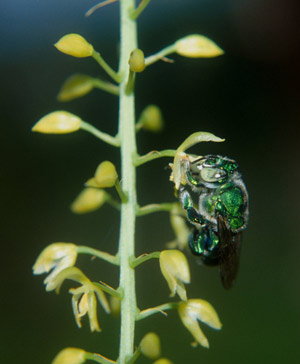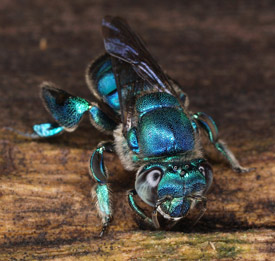
By Sarah Yang, UC Berkeley Media Relations
BERKELEY — Orchid bees aren’t so dependent on orchids after all, according to a new study that challenges the prevailing view of how plants and their insect pollinators evolve together.
A long-standing belief among biologists holds that species in highly specialized relationships engage in a continual back-and-forth play of co-evolution.
“What we found was that this reciprocal specialization did not exist for orchid bees and orchids,” said study lead author Santiago Ramirez , post-doctoral researcher in the lab of Neil Tsutsui, associate professor at the University of California, Berkeley’s Department of Environmental Science, Policy, and Management. “The bees evolved much earlier and independently, while the orchids appear to have been catching up.”
The bond between specific bees and the orchid plants they visited has been well-documented by botanists and naturalists, including Charles Darwin. Biologists discovered that male bees needed the specific perfume compounds produced by the flowering plants in order to mate with female bees.
In the study, published in the Sept. 23 issue of the journal Science, the researchers screened more than 7,000 individual male bees and sequenced DNA from 140 orchid pollinaria, which are small packages that contain all the pollen grains produced by a single flower. The researchers were able to infer the evolutionary history of both bees and orchids, and establish which species of bee pollinates what species of orchid. The researchers also quantified and analyzed the perfumes collected by orchid bees and compared them with the compounds produced by orchid flowers.
To their surprise, the scientists found that the bees evolved at least 12 million years earlier than their orchid counterparts. Additionally, they found that the compounds produced by the orchids only accounted for 10 percent of the compounds collected by their pollinators. The remaining 90 percent could be coming from other sources, including tree resins.

“It appears that the male bees evolved a preference to collect these compounds from all kinds of sources, and the orchids converged on that chemical preference millions of years later,” said Ramirez.
In essence, orchids need their bee pollinators more than the bees need them.
The findings have implications in conservation biology, particularly because of the alarming decline over the past 15 years of bee pollinators worldwide.
“Many plant species are extremely dependent on their pollinators,” said Ramirez, who began this work while he was a Ph.D. student in the lab of Naomi Pierce, Harvard University professor of biology. “If you lose one species of bee, you could lose three to four species of orchids. Many of these orchids don’t produce any other type of reward, such as nectar, that would attract other species of bee pollinators.”
“Our study is consistent with the emerging theory that insect sensory biases have played a major role in driving reproductive adaptations in flowering plants,” said Ramirez. “It highlights the ecological and evolutionary inter-dependence of flowering plants and their specialized pollinators, suggesting that new threats to insect pollinators may have profound effects on the ecosystems they inhabit.”
